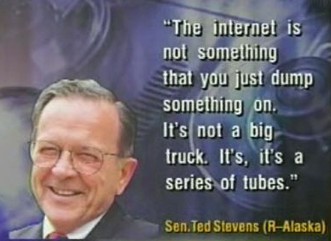Net Neutrality is economically optimal
Matthew Martin
11/04/2013 05:32:00 PM
Tweetable
 |
| I still have no idea what Stevens was trying to say here. |
First things first: as best I can tell, the term "bandwidth" as applied to the internet is little more than industry propaganda. What I mean is that unlike radio, where there is a fixed section of the electromagnetic spectrum that can be used to transmit data, there is no analogous limitation for the internet--Internet Service Providers (ISPs) can build as many or as few cables as they want, and therefore face no theoretical limit to the quantity of data they can transmit at any given speed.
That said, it is true that at any given point in time, the quantity of data that can be transmitted is constrained by the existing cables and infrastructure (ok, in practice the actual cables are never the limiting factor in a network--it's usually the servers, modems, and connections instead, so just realize that I use the term "cables" somewhat metaphorically here). That means that there is potential for "congestion" during high-usage periods where lots of people are trying to stream a lot of data all at once. Obviously, we'd like ISPs to build enough infrastructure to handle this traffic, but we must still weigh the social costs of building infrastructure (i.e. that's technology that could have been spent treating kids with cancer!) against the social benefit of being able to stream that extra packet of data during the high-demand times. That is, the benefit of being able to stream more data during high-demand times may not justify the expense of building more internet cable lines.
Congestion leads to a market failure when it does not prioritize internet usage based on the social benefits of the type of usage. That is, it is arguably more important to society to allow someone to quickly access a web page on how to do the Heimlich maneuver--which may be life or death for someone--than to stream an episode of Glee. During periods of high internet usage, it may not be possible for an ISP to transfer the data for both of these activities simultaneously, so we want to prioritize. This has been the ISP lobby's argument for why net-neutrality laws are harmful--ISPs claim they want to have the ability to prioritize google searches on the Heimlich over episodes of Glee, for example. In reality however, this reasoning yields the opposite result--net neutrality is optimal.
The optimal policy turns out to be to allow ISPs to engage in content-neutral "congestion-pricing," wherein they cannot charge more for streaming Glee than googling the Heimlich, but they can charge more for using more data during high-traffic times. The congestion fee naturally incentivizes the market to prioritize internet usage, because your willingness to pay for data depends on how valuable that data at that time is to you--in our example, the person administering the Heimlich is going to have a higher willingness-to-pay than the person streaming and episode of Glee, so congestion pricing will naturally cause the Glee fan to wait until a less busy time to stream the episode, leaving that bandwidth available for other more important tasks. Because the social benefit of internet usage is equal to the sum of all the individual people's values of their own internet usage, congestion pricing actually prioritizes internet usage according to it's social benefit. Hence, congestion pricing results in an efficient allocation of network resources both across individuals, and across types of content, even though net-neutrality is honored.
By contrast, the ISP's proposal to violate net neutrality is Pareto inefficient. The most obvious way to see why is simply to consider the supply side: when ISPs can generate revenue not by transferring more data faster, but instead by charging extra to get certain types of data faster than other types of data, the incentive for ISPs to build more cable lines is reduced. That means we will end up with an inefficiently small amount of available bandwidth while customers pay through the nose to avoid having their favorite kinds of content downgraded to slower connections.
To the extent that congestion is a real concern (there is lot's of evidence it isn't), this argues for, not against, net neutrality as the FCC has defined it.